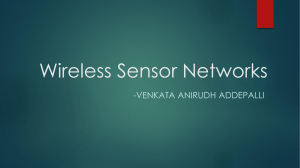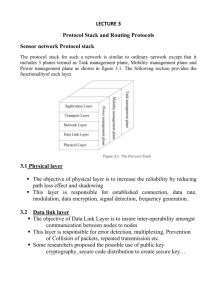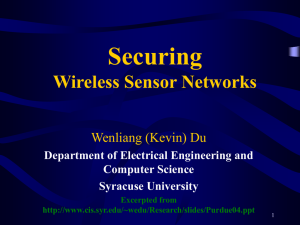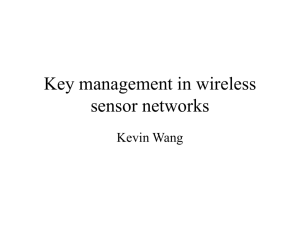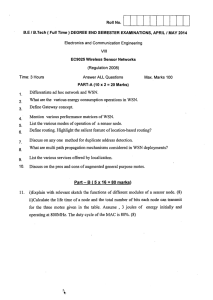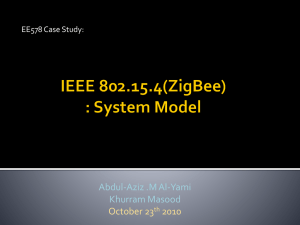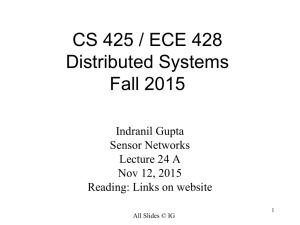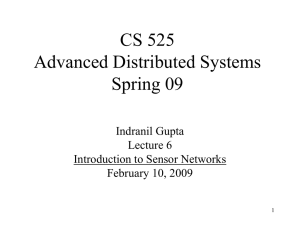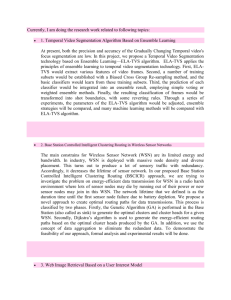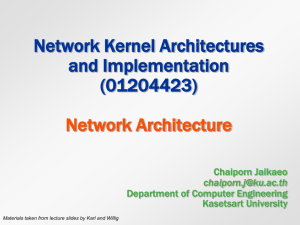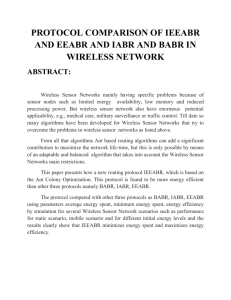Implement and Estimating Cost of Security in
advertisement
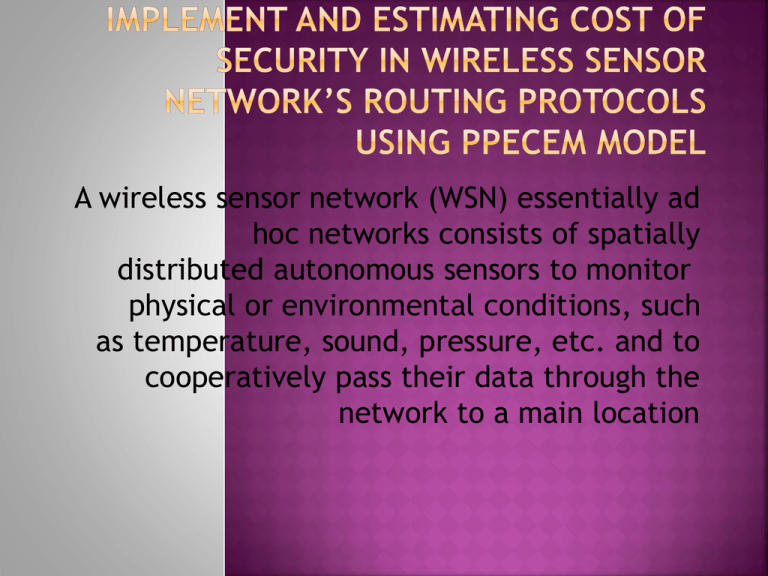
A wireless sensor network (WSN) essentially ad hoc networks consists of spatially distributed autonomous sensors to monitor physical or environmental conditions, such as temperature, sound, pressure, etc. and to cooperatively pass their data through the network to a main location Sensor module collects the observations from surrounding environmental analog information such as light, sound, shocks, etc, converts it to the digital signal via the analog to digital converter (ADC), and then transfers to the processor unit Processor module manages the cooperation between the units in the sensor, the collaborations between other WSN nodes in the network. Wireless communication module communicate between WSN nodes and Base Station Wireless Sensor Network Technology Operating systems Programming languages Contiki ,ERIKA Enterprise, Nano-RK, TinyOS ,LiteOS ,OpenTag, NanoQplus ANT, 6LoWPAN, DASH7, ONE-NET, ZigBee, Z-Wave, Wibree, WirelessHART, 802.15.4, MiWi C, LabVIEW,nesC Hardware Iris Mote, Sun SPOT, Xbee, Arduino Software TinyDB, TOSSIM, NS-2, OPNET, NetSim, LinuxMCE Key distribution, Location estimation, Sensor Web, Telemetry AODV, DSR, TSMP Industry standards Applications Protocols Used in Project OS (TinyOS), platform(Micaz), Programming language C++,Protocol(AODV, DSR, TSMP) Sensor Web/ Sensor Grid, Internet of things,M2M Ubiquitous Computing : Smart home/Cities, smart meter, smart TV/appliances,. Future with Graphene Smart dust is hot. Message Queue Telemetry Transport (MQTT). Used by Facebook,IBM smart planet initiatives Already in use Disaster management, Alternative energy , health monitoring, agriculture, defense. WSN nodes are very small and design is dominates by size of battery. WSN are using various technology like energy harvesting ,piezoelectric material technology to reduce size of battery. Power consumption in sensor networks can be divided into three domains: sensing, communication and data processing. Router node consume more power than leaf nodes. Due to unbalanced energy consumption, WSN nodes on busy routing paths may drain their batteries faster than other nodes, Energy aware routing is important. data-centric: like directed diffusion, sensor protocols for information via negotiation (SPIN) and power aware many-to-many routing fall into this category cluster-based: Low-energy adaptive clustering hierarchy (LEACH) is an example of a cluster-based sensor network routing algorithm. location-based: minimum energy communication network (MECN) and geographic adaptive fidelity (GAF) are location-based routing algorithms. QOverall = QCPU + QRadioTrans + QRadioRcv QCPU = PCPU * TCPU = PCPU * (BEnc * TBEnc + BDec * TBDec +BMac * TBMac + TRadioActive). PX in Eq. 2 represents the power of device X. TX means the computation time of device X TBY denotes the per-byte time consumed for doing operation Y. BY indicates the amount of bytes to be computed by operation Y Enc, Dec and Mac denote the encryption, decryption, and MAC digest generation operations respectively TRadioActive represents the radio transceiver’s active time, as the processor module remains active while the radio chip is turned on. QRadioTrans = PRadioTrans * (KTrans * BTrans + TStartup) QRadioRcv = PRadioRcv * (KRcv * BRcv + TIdle) Decide the price of adding security to WSN routing protocols or further estimate the network lifetime of their WSNs Mathematical models used to estimate extra energy consumption of routing protocols due to security features in WSN. Empirical values and physical actual values are compared to validate model for different routing protocols. S.No. 1 2 3 4 5 6 7 8 Task Setting up MicaZ platform Routing protocols setup in on hardware and OS platform. Vulnerability and security of protocols Writing code on TinyOS on MicaZ Testing codes for various routing protocols Taking measure for each protocol and applying model Comparing empirical values with model values Presentation of results From date To Date March 01 2013 15 March 2013 15 March 2013 31 March 2013 31 March 2013 15 April 2013 15 April 2013 15 May 2013 15 May 2015 30 May 2013 30 May 2015 30 June 2013 30 June 2013 15 July 2013 15 July 2013 25. July 2013
